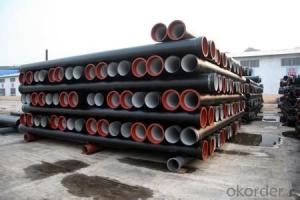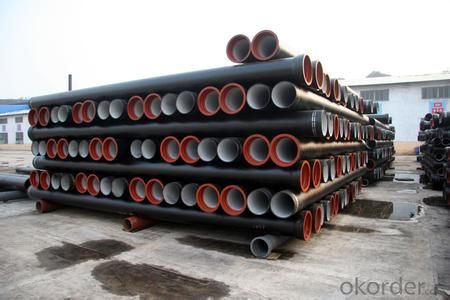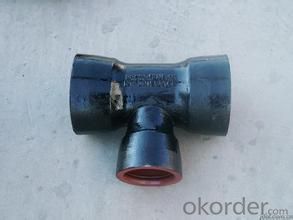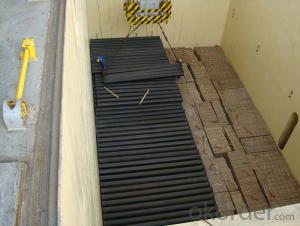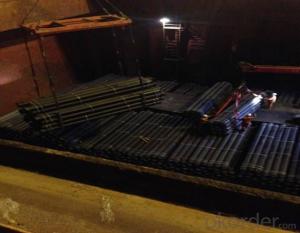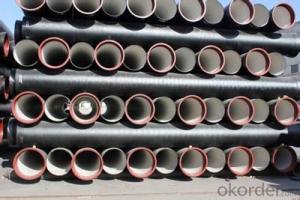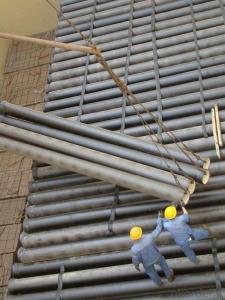DUCTILE IRON PIPE K9 CLASS DN600
- Loading Port:
- Tianjin
- Payment Terms:
- TT OR LC
- Min Order Qty:
- 32 pc
- Supply Capability:
- 3000 pc/month
OKorder Service Pledge
OKorder Financial Service
You Might Also Like
· Material : Ductile Cast Iron
· Size Range : DN 80mm to DN 2000mm
· Unit Effective Length : 6m or 5.7m
· Manufacture Standard: ISO 2531:1998/ EN 545:2006/EN 598:2007
· Annual capacity : 200,000 tons
· Coating Exterior: Zinc 130g/m2 according to ISO 8179-1 and bitumen coating 70 microns.
· Cement Interior: Portland Cement/ High Alumina Cement/ Sulphate Resisting Cement Lining according to ISO 4179
· Special requirements on external coating and internal lining can be applied
· We also provide accessories such as SBR/EPDM rubber gaskets, lubricant paste, pipe caps, PE sleeves, etc.
Additional Parts:
Each pipe is strictly inspected according to related standard to ensure permanently high performance.
Easy Installation at site and service free for life
Long Service Lifespan
Quotation will arrive you within 24hours once we get your inquiry.
We guarantee offering you a competitive price.
A copy of original inspection reports of pipes will be offered after shipment.
Photos of loading process will be sent to the customer after shipment effect.
We will follow-up the delivery progress after shipment effect and update to the customer on weekly basis.
- Q: Ductile iron pipes perennial bubbles in the water will rot it
- From the hydraulic performance, because ductile pipe specifications generally refers to the inner diameter of PE pipe diameter specifications generally refers to the same specifications, because under the condition of ductile pipe can achieve greater runoff; from the installation and maintenance cost, ductile pipe have more favorable price. The inner wall of zinc spray, anti-corrosion materials such as cement mortar, ductile iron pipe perennial bubbles in the water will not be rotten.
- Q: What are the different types of fittings available for ductile iron pipe?
- There are several different types of fittings available for ductile iron pipe. These fittings are designed to connect, redirect, or branch off the pipe in various configurations to suit different plumbing or piping systems. One common type of fitting is the flanged fitting, which features a flange or lip on one end that allows for easy bolted connection to another flanged component. Flanged fittings are commonly used in applications where a tight seal is required, such as in water or sewage systems. Another type of fitting is the mechanical joint fitting, which utilizes a gasket and a set of mechanical bolts to create a secure connection between two pieces of pipe. Mechanical joint fittings are often used in underground water or sewer systems. Push-on fittings are another popular option for ductile iron pipe. These fittings have a rubber gasket that is compressed onto the pipe, creating a watertight seal. Push-on fittings are quick and easy to install, making them ideal for applications where speed and efficiency are important. For situations where a change in direction is required, ductile iron pipe fittings such as elbows or bends are used. These fittings are designed to smoothly change the direction of the pipe without causing any significant flow restrictions. Additionally, there are saddle fittings available for ductile iron pipe. These fittings are used to create a branch connection on an existing pipeline without the need for cutting or welding. Saddle fittings are commonly used in irrigation or fire protection systems. Overall, the different types of fittings available for ductile iron pipe provide a range of options to meet the specific needs of different plumbing or piping systems. Whether it's flanged fittings for a tight seal, mechanical joint fittings for underground applications, push-on fittings for quick installation, or specialized fittings like elbows or saddle fittings, each type serves a specific purpose in the overall plumbing or piping system.
- Q: Can ductile iron pipes be used for stormwater drainage?
- Yes, ductile iron pipes can be used for stormwater drainage. Ductile iron pipes are known for their strength, durability, and ability to withstand heavy loads, making them a suitable choice for various applications, including stormwater drainage systems.
- Q: What are the different methods for restraining ductile iron pipe?
- There exist various techniques for restraining ductile iron pipe to prevent any movement or displacement caused by internal pressure, external forces, or ground movement. The most commonly used approaches include: 1. Thrust blocks: Concrete blocks or structures are positioned at bends, tees, or other directional changes in the pipe. These blocks are designed to resist the forces exerted by flowing water or fluids within the pipe, effectively anchoring it in place. 2. Mechanical restraints: Harnesses or clamps are installed around the pipe and affixed to a fixed structure, such as a wall or concrete anchor. These restraints provide a physical barrier that prevents any movement or shifting of the pipe. 3. Pipe restraints: Devices directly attached to the pipe and anchored to a fixed structure, such as pipe clamps, restraints, or saddles. They are designed to securely hold the pipe in place and resist any movement or displacement. 4. Proper pipe bedding and backfill: It is crucial to properly support and surround the pipe with compacted material to prevent any movement or shifting. This method involves carefully placing and compacting soil or suitable materials around the pipe to provide stability and prevent displacement. 5. Trench walls: The walls of the trench where the ductile iron pipe is installed can also contribute to restraining it. By correctly compacting the soil against the pipe and ensuring proper stability of the trench walls, the pipe can be effectively restrained and prevented from moving. Overall, the various methods for restraining ductile iron pipe aim to ensure its secure placement without any displacement or movement. The choice of method depends on factors such as location, application, and the forces acting on the pipe. It is important to consult with engineers and adhere to industry guidelines and standards to determine the most appropriate method for restraining ductile iron pipe in specific situations.
- Q: Are ductile iron pipes suitable for installation in rocky or hard soil conditions?
- Yes, ductile iron pipes are suitable for installation in rocky or hard soil conditions. Ductile iron pipes are known for their strength and durability, making them well-suited for challenging soil conditions. Their high tensile strength allows them to withstand external loads and pressures, including the presence of rocks or hard soil. Additionally, ductile iron pipes are resistant to corrosion, which further enhances their suitability for installation in such conditions. The pipes' flexibility and ability to withstand bending stresses also make them a reliable choice for rocky or hard soil conditions, as they can accommodate ground movement without compromising their structural integrity. Overall, ductile iron pipes are a preferred option for installations in challenging soil conditions due to their robustness, longevity, and resilience.
- Q: What are the different lining materials available for ductile iron pipe?
- There are several different lining materials available for ductile iron pipes. These linings are used to protect the pipe from corrosion and extend its lifespan. Some common lining materials include: 1. Cement Mortar Lining: This lining consists of a layer of cement mortar applied to the interior surface of the pipe. It provides a smooth and durable barrier against corrosion and is commonly used in water and wastewater applications. 2. Polyethylene Encasement: Polyethylene encasement involves wrapping the pipe with a layer of polyethylene film. This lining provides excellent corrosion protection and is often used in aggressive soil conditions. 3. Polyurethane Lining: Polyurethane lining is a spray-applied material that forms a seamless and flexible barrier inside the pipe. It offers superior resistance to chemicals and abrasion, making it suitable for applications involving aggressive fluids. 4. Epoxy Lining: Epoxy lining is a popular choice for lining ductile iron pipes, as it provides excellent resistance to corrosion and chemicals. It is typically applied as a liquid coating that cures to form a smooth and protective layer. 5. Zinc Coating: Zinc coating, also known as galvanizing, involves applying a layer of zinc to the exterior surface of the pipe. This lining provides corrosion resistance and is commonly used in outdoor and exposed applications. These lining materials offer different advantages and are chosen based on the specific needs of the application. Factors such as the type of fluid being transported, environmental conditions, and expected service life are considered when selecting the most suitable lining material for ductile iron pipes.
- Q: How are ductile iron pipes protected during transportation and storage?
- Ductile iron pipes are protected during transportation and storage through various methods to ensure their integrity and prevent any potential damage. Firstly, these pipes are typically coated with a protective layer, such as epoxy or zinc, which acts as a barrier against corrosion. This coating helps to safeguard the pipes from moisture and other corrosive elements during transit and storage. Additionally, ductile iron pipes are often bundled together and secured with straps or bands to prevent any movement or shifting that could lead to mechanical damage. This bundling also makes it easier to handle and transport the pipes in a more organized manner. During transportation, the pipes are usually loaded onto pallets or placed in crates to provide added protection and stability. This helps to minimize the risk of any accidental impact or rough handling that could potentially cause cracks or fractures. Furthermore, proper labeling and marking of the pipes is essential to ensure that they are handled appropriately. This includes displaying handling instructions, weight limits, and pipe specifications, which helps prevent mishandling and damage during transportation. Moreover, storage conditions are crucial to maintaining the integrity of ductile iron pipes. They should be stored in a clean, dry, and well-ventilated area to prevent exposure to moisture and humidity. Pipes should be kept away from direct sunlight and extreme temperatures to avoid any potential degradation of the protective coating. In conclusion, protecting ductile iron pipes during transportation and storage involves applying protective coatings, bundling and securing them, utilizing appropriate packaging materials, ensuring proper handling and labeling, and storing them in suitable conditions. These measures aim to maintain the quality and structural integrity of the pipes, ensuring they arrive at their destination in optimal condition.
- Q: Are ductile iron pipes suitable for installation in areas with high soil settlement and consolidation?
- Ductile iron pipes are commonly used in areas where there is significant soil settlement and consolidation. One of the main advantages of these pipes is their ability to withstand external loads and accommodate ground movement. Compared to other pipe materials, ductile iron pipes are known for their strength and flexibility, making them more resistant to soil settlement and consolidation. They have a higher tensile strength and can withstand heavy loads and ground vibrations without cracking or breaking. This makes them suitable for areas with soil prone to settlement and consolidation. Moreover, ductile iron pipes have a high resistance to corrosion and can withstand aggressive soil conditions, which are often found in areas prone to settlement and consolidation. They are also less likely to be damaged by external factors such as roots or rocks, making them even more suitable for installation in such areas. However, it is important to consider the specific conditions of the site and consult with engineers or experts who are familiar with the local soil conditions. Factors such as the magnitude and rate of settlement, soil type, groundwater levels, and construction methods should be taken into account when determining whether ductile iron pipes are appropriate for installation in areas with high soil settlement and consolidation. In conclusion, ductile iron pipes are generally a suitable choice for installation in areas with high soil settlement and consolidation. Their strength, flexibility, resistance to corrosion, and ability to withstand external loads make them a reliable option for these conditions. Nevertheless, it is always recommended to assess the specific site conditions and consult with professionals to ensure the most appropriate pipe material is selected for each project.
- Q: Which is good for water polo cast iron pipe steel pipe?
- In summary, if the demand is not high, the use of stable environment, pressure and vibration is not a place recommend the use of ductile iron pipe; if is an important facility for high requirements or site conditions, abnormal conditions, vibration and impact may be relatively large, with ordinary seamless steel tube.
- Q: Are ductile iron pipes suitable for water distribution networks?
- Ductile iron pipes are a suitable choice for water distribution networks. They have been widely used in water distribution systems for many years, thanks to their numerous advantages. To begin with, ductile iron pipes possess excellent durability and a long lifespan. Their resistance to corrosion is crucial for water pipes since they are continuously exposed to various chemicals and substances in the water. This corrosion resistance ensures that the pipes maintain their structural integrity over time, reducing the frequency of repairs or replacements. Furthermore, ductile iron pipes have a high strength and can withstand high pressure, making them ideal for water distribution networks. They can handle heavy loads and resist external forces such as soil movement or traffic loads, guaranteeing the safety and reliability of the water supply. Moreover, ductile iron pipes exhibit excellent hydraulic properties. With their smooth internal surfaces, they minimize friction and pressure drop, enabling the efficient flow of water through the system. This aids in conserving energy and reducing pumping costs, making ductile iron pipes a cost-effective choice for water distribution networks. Additionally, ductile iron pipes are versatile and can be easily installed in various soil conditions. They can endure ground movement and settle without breaking, which is crucial for maintaining a stable water distribution system. In conclusion, ductile iron pipes are highly suitable for water distribution networks due to their durability, resistance to corrosion, high strength, excellent hydraulic properties, and versatility in installation. They offer a reliable and efficient solution for delivering safe and clean water to communities.
Send your message to us
DUCTILE IRON PIPE K9 CLASS DN600
- Loading Port:
- Tianjin
- Payment Terms:
- TT OR LC
- Min Order Qty:
- 32 pc
- Supply Capability:
- 3000 pc/month
OKorder Service Pledge
OKorder Financial Service
Similar products
Hot products
Hot Searches
Related keywords
